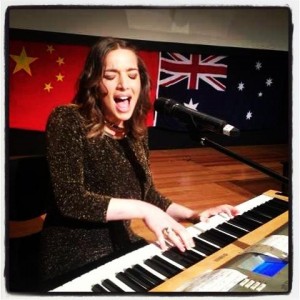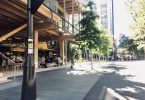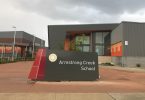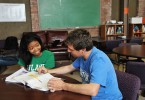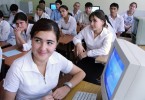Clarissa Belanti’s passion for opera came from her many singing performances for her grandparents as a child. At around the age of 9, Clarissa first saw herself performing at the magnificent Sydney Opera House in a dream that, even after her transition into adulthood, never quite left her. A decade later, Clarissa has been given the opportunity to turn that dream come into reality. Yet Clarissa believes it’s a skill set outside of her musical abilities that has catapulted her into life-changing events such as this one: languages.
Among all the pet names Clarissa goes by, it is being referred to an egg that is her most favourite. According to the RMIT International Studies student who is fluent in Mandarin, this description fits her well for being “white” on the outside, but “yellow” on the inside.
“Rather than the name ‘banana’, used for ABCs (Australian Born Chinese), my Chinese friends all call me an ‘egg’!” she says.
Having attended the Penleigh and Essendon Grammar School, Clarissa took up Chinese as well as German as an elective and saw her interest for languages stem from her early schooling years. However, it was not until she reached the secondary years that Clarissa discovered her love for all things Chinese.
After joining the Chinese orchestra at her school as a singer, Clarissa was mentored by her teachers to fuse two of her biggest passions – Chinese language and opera. As well as participating in the school orchestra, Clarissa also entered the Chinese Bridge Speaking Competition annually since Year 7 – and always won first place. It was her passion for the Chinese language and contribution she was making which saw Clarissa land a music scholarship to any Chinese University of her choice from the Chinese-Consular in Melbourne.
“The more Chinese I learnt the more Chinese people’s hearts’ I captured, and opportunities I gained.”
It has been widely reported that Victoria has one of the lowest numbers of students studying a language throughout the nation. Though the benefits of learning a second language cannot be refuted, many students who attend Victorian schools are second-generation migrants and so already speak a second language. In fact, Australia is one of the few countries that is bilingual to the point where the country has no official language. According to the 2011 census, 23.2% of people spoke languages other than English at home, with some of these other languages including Mandarin (1.6%), Italian (1.4%), Arabic (1.3%) and Greek (1.2%). So can our multicultural society be attributed to our poor language study statistics?
According to Wikum Kuruppu, a fluent speaker of English and Sinhalese, there was no need to learn another language. Having learnt Sinhalese at home before learning English at school, Wikum believes his proficiency in two languages deterred him from studying an extra language during high school. However, he believes others should take up the study of a second language other than English.
“Learning another language can be a stimulating endeavour. School exchange, international career prospects and travel are all opportunities that open up for language studiers”.
Though recommending students from an English-only background to take up a second language, Wikum believes that such study should be instigated through interest and passion, rather than by force.
“As my heart wasn’t in learning another language, I am grateful for my primary and secondary schools (Essex Heights Primary and Mount Waverley Secondary College) flexibility in not forcing students to learn a language. I can testify to this because 8 years after my VCE, not having learnt a language in school is something I don’t regret.”
Forcing students to study a language is a concept both oppose, as they do the Victorian government’s decision to ditch a statewide target designed to boost the number of students who are proficient in languages such as Mandarin. A part of the state government’s target was to have every child from prep to year 10 learning a second language by 2025. However, now the government has terminated these plans as it reassess how languages are currently offered in Victorian schools and what tactical approaches can be taken to help boost the number of students studying languages.
The Modern Language Teachers Associations’ of Victoria (MLTAV) is a professional association for Languages teachers that aim to encourage and promote the learning of Languages as an essential part of the school curriculum. According to the Office Manager, Kerry O’Connor, there is still much confusion about what exactly the government plans to do in terms of boosting Victorian language study. A formal letter has been requested by Education Minister, James Merlino MP that the MLTAV will be publishing in their November Journal.
“We didn’t agree with everything that was proposed by the government but the 2025 targets were great because we had a specific goal that we could all work towards and that makes it easier to have specific things enforced.”
O’Connor says there are immense benefits to studying languages and that language study can put you on the path of achieving extraordinary things.
Clarissa is a prime example of just what you can achieve with the knowledge of an extra language. She believes her Chinese study has given her the platform to the world stage and she owes all her success to her language study.
“I strongly recommend learning a second language in high school. Not only does it boost your Year 12 exam results, but gives you a stepping-stone to bigger and better career opportunities. Just having a second language on your resume instantly puts you above another candidate.”
Living in the one of the most multicultural cities in the world, Clarissa believes everyone should take an active role in embracing the different nationalities and languages spoken in Melbourne.
“It is so important to speak other languages in our country which is abundant with international students, tourists and migrants. We are so lucky that we can make friends with people from all over the world right here.”

